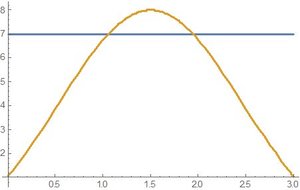Try your hand at the 7's
What is the smallest integer value of such that the above inequality is true for all positive real ?
This section requires Javascript.
You are seeing this because something didn't load right. We suggest you, (a) try
refreshing the page, (b) enabling javascript if it is disabled on your browser and,
finally, (c)
loading the
non-javascript version of this page
. We're sorry about the hassle.
Consider the function g α ( x ) = x α ( x + 1 ) 3 x > 0 for any
0
<
α
<
3
. Then
g
α
′
(
x
)
=
x
α
+
1
(
x
+
1
)
2
[
(
3
−
α
)
x
−
α
]
from which it is clear that the minimum value of
g
α
(
x
)
is
h
(
α
)
=
g
α
(
3
−
α
α
)
=
(
3
−
α
)
3
−
α
α
α
2
7
.
Plotting the function of
h
(
α
)
against
α
, we see that
h
(
α
)
>
7
when
α
lies in a specific range. Solving the equation
h
(
α
)
=
7
numerically, we deduce that
h
(
α
)
>
7
for
1
.
0
5
5
8
1
<
α
<
1
.
9
4
4
1
9
, approximately.
for any
0
<
α
<
3
. Then
g
α
′
(
x
)
=
x
α
+
1
(
x
+
1
)
2
[
(
3
−
α
)
x
−
α
]
from which it is clear that the minimum value of
g
α
(
x
)
is
h
(
α
)
=
g
α
(
3
−
α
α
)
=
(
3
−
α
)
3
−
α
α
α
2
7
.
Plotting the function of
h
(
α
)
against
α
, we see that
h
(
α
)
>
7
when
α
lies in a specific range. Solving the equation
h
(
α
)
=
7
numerically, we deduce that
h
(
α
)
>
7
for
1
.
0
5
5
8
1
<
α
<
1
.
9
4
4
1
9
, approximately.
Now consider the function f α ( x ) = ( x + 1 ) 3 − 7 x α = x α [ g α ( x ) − 7 ] x > 0 It is clear that f α ( x ) will be negative for large enough x whenever α ≥ 3 ; in the range 0 < α < 3 we see that f α ( x ) > 0 for all x > 0 provided that g α ( x ) > 7 for all x > 0 , and this happens when 1 . 0 5 5 8 1 < α < 1 . 9 4 4 1 9 .
Back to the problem. We note that (using the AM/GM inequality) ( a + 1 ) ( b + 1 ) ( c + 1 ) = a b c + ( a b + a c + b c ) + ( a + b + c ) + 1 ≥ a b c + 3 ( a b c ) 3 2 + 3 ( a b c ) 3 1 + 1 = ( 1 + ( a b c ) 3 1 ) 3 Note that this inequality can be made an equality by choosing a = b = c , and so the next stage is the key one. Provided that 1 . 0 5 5 8 1 < α < 1 . 9 4 4 1 9 we deduce that ( a + 1 ) ( b + 1 ) ( c + 1 ) ≥ ( 1 + ( a b c ) 3 1 ) 3 > 7 [ ( a b c ) 3 1 ] α a , b , c > 0 and hence that [ ( a + 1 ) ( b + 1 ) ( c + 1 ) ] 7 > 7 7 ( a b c ) 3 7 α a , b , c > 0 and so we deduce that the inequality [ ( a + 1 ) ( b + 1 ) ( c + 1 ) ] 7 > 7 7 ( a b c ) σ a , b , c > 0 holds provided that 2 . 4 6 3 5 5 < σ = 3 7 α < 4 . 5 3 6 4 5 . Thus the least integer value of σ that works is 3 .